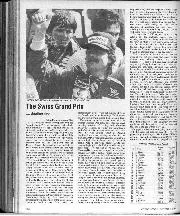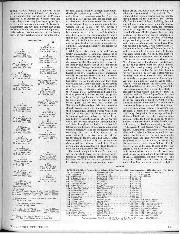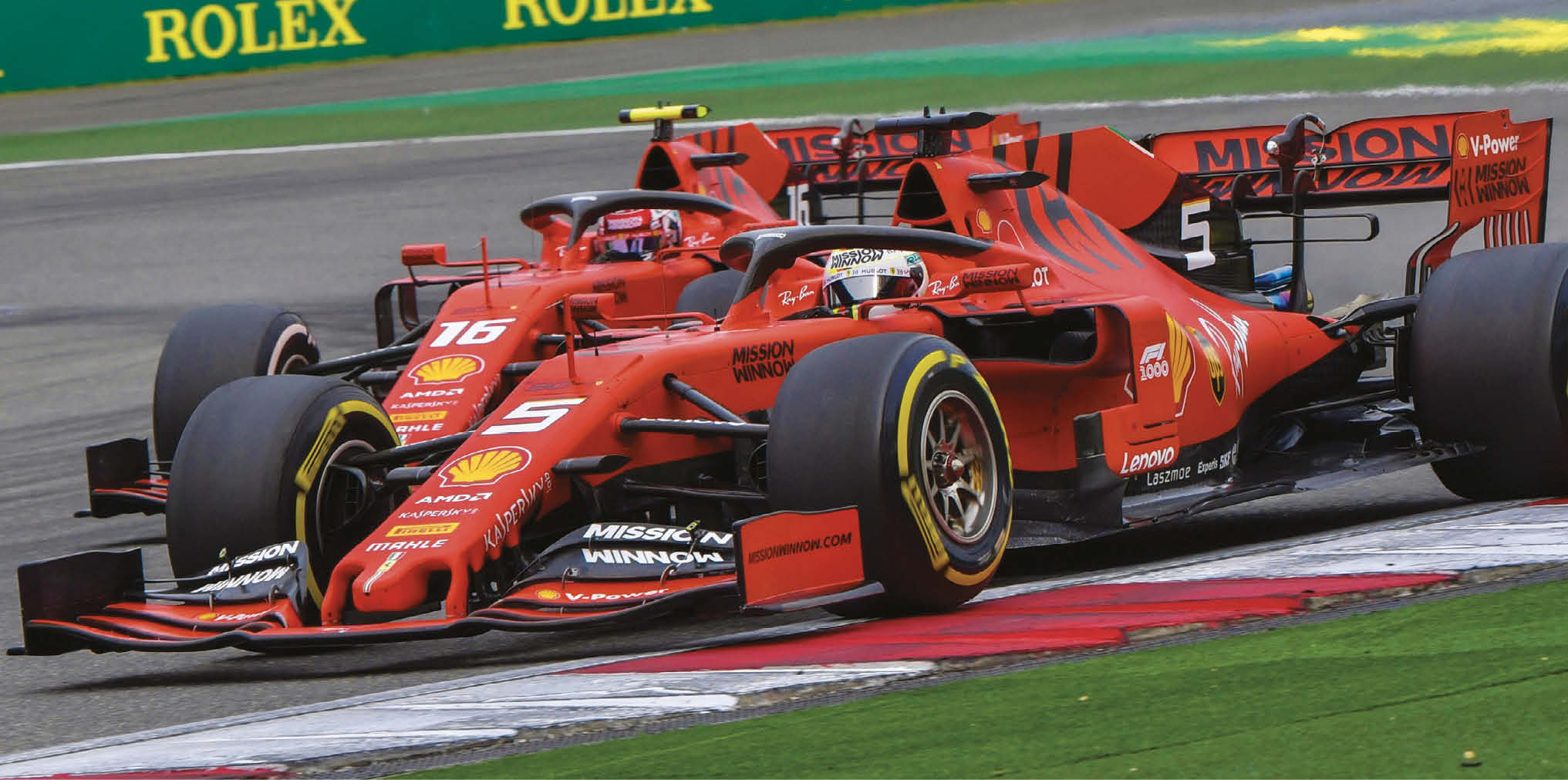

1982 Swiss Grand Prix race report
Another first Dijon-Prenois, August 29th THIS has been the season for surprises, with the Spanish Grand Prix not happening and nobody really noticing, a race appearing round the streets of…
The spotlight could not have been any brighter upon Charles Leclerc as he stood adjacent to his pole position-sitting Ferrari in Bahrain, the 21-year-old calm in the eye of the hurricane as TV crews jostled to speak with him while Scuderia personnel became stressed and animated as they struggled to reach him. They needn’t have worried; he had it all under control. Just as he had since the wheels began turning on Friday. In contrast to Melbourne, the Ferraris were faster than the Mercedes in Bahrain and Leclerc was quicker than Sebastian Vettel. There was no ambiguity about either of those things. Which had potentially profound implications, not only upon the season but even for the future of the four-time champion.
Vettel’s Ferrari sat alongside that of the new sensation, having qualified 0.3sec slower and only barely ahead of the two Mercedes W10s of Lewis Hamilton and Valtteri Bottas. The Ferraris were taking 0.6sec out of the Mercs down the straights and clawing only half of that back to Leclerc through the corners. GPS analysis suggested that whatever Ferrari’s engine problems had been in Australia, they were now sorted. A basic combustion advantage was not only punching them through the corners better but feeding the battery more efficiently and allowing them to deploy the ERS-k for longer. The aero imbalance was also gone – at least for Leclerc. For Vettel things were not so serene; with his more specific demands of the car’s rear end, he was never truly comfortable with the SF90, especially in the downhill sweeps of sector one, where Leclerc took most time out of him.
It looked as though Vettel had put all that behind him as the gantry lights went out in the floodlit dusk and he made a beautiful getaway to lead, as Leclerc struggled for a few corners to get his tyres up to temperature and briefly lost a place to Bottas before repassing at the end of the opening lap, as gusty winds caused the Merc to lock a wheel. With the Ferraris running 1-2, Vettel ahead, it might ordinarily have been assumed that was that, even as Leclerc quickly closed up onto the tail of his team-mate. But Leclerc’s speed advantage from qualifying was still there and this was the moment he made specific his intention not to fall into any notional support role.
Bobbing around in Vettel’s mirrors was the talent and ambition of an aspiring champion a decade younger than the leader, the driver Sergio Marchionne had singled out for the future. Well, the future had just arrived on Vettel’s tail and now the team was faced with a situation that had always been coming. “Guys, I’m quicker,” Leclerc advised the team. “Stay behind for next two laps,” he was advised.
He wasn’t much interested in complying with that as the opportunity to pass presented itself three-quarters of a lap later, Leclerc getting DRS onto the pit straight and passing cleanly before Turn 1. Disobeying a team instruction but also grabbing hold of his destiny, he sailed off into the night.
This was a fascinating dynamic. Rather than become embroiled in a discussion with the team, Leclerc had simply transcended the situation. It was also the first test of Mattia Binotto’s leadership and, as befitting his calm demeanour, he let it ride. In public, at least. The fire had been put out before it had even started, which in as combustible an environment as Ferrari was significant. There was no public censure later, Binotto emphasising that the drivers were allowed to race.

Leclerc’s dream ended with a control electronics failure that cut an injector out, putting him a cylinder down in the late stages. But Vettel wasn’t there to take advantage, having spun (again!) when dicing with Hamilton. Hamilton took the victory for Mercedes – but very much against the run of play – as Leclerc limped home third, behind Bottas, helped from running out of fuel in the misfiring engine by the race ending under a safety car. Hamilton, who’d offered an almost apologetic gesture as he’d passed the sick Ferrari, commiserated with the young Monégasque, his body language suggesting respect above all else. This one is strong.
Two weeks later in Shanghai, Binotto was throwing his support behind his senior driver, without admonishing Leclerc. “Sebastian has won four championships and certainly for us he’s the driver who has most probability to challenge for the title… he will be prioritised if there is any 50-50 situation where we need to make a decision. But on the track, they’re free to fight. On the track I think if there is one driver who is certainly faster, he will get the advantage.”
Leclerc said an equally smart thing: “I understand. We need a number one and a number two, but I will be sure to change these things as soon as possible. It is not easy. I have to stay in front for qualifying. Seb is extremely quick. My job? I have to do it in the car.”
“[In Bahrain] I wasn’t happy with my performance,” said Vettel, “not yet happy about my feeling with the car. I know that I can be better and I know we have lots of races to show and prove that. But at least when I’m not at the top of it, it’s good that he is.”
For Vettel, a lot was riding on his performance in China. It was good for him that there’d been a Bahrain test after the race there. “That was very helpful. We learned some things about car behaviour that we couldn’t in Barcelona, where we were looking at other things. Hopefully I have a better feeling in the car this weekend, with the rear end in particular.”
That was the good news for China, the 1000th race counting towards the world championship. The bad was that Mercedes was clearly quicker around a layout very different to that of Bahrain. Vettel outqualified Leclerc by a couple of hundredths of a second for third on the grid – a good 0.3sec adrift of the Mercedes pair. He beat him in the race, too, but not in a straightforward way.
The tension was very evident as Vettel – having lost out to Leclerc in the first corner jostling behind the Mercs – cruised up to the back of his team-mate and returned Leclerc’s Bahrain serve. “I’m quicker,” he related. He didn’t force it as Leclerc had, but waited – and waited – for Ferrari to tell the youngster to move aside. He did so, but not particularly gracefully. “What now?” he asked as he sat close behind Vettel, whose tyres had degraded running so long in Leclerc’s dirty air.
A little while later, Leclerc offered the following: “I’m losing quite a bit of time here. I don’t know if you want to know. Just letting you know.” It was all smoothed over post-race by Mattia Binotto and Leclerc himself accepted, “It’s difficult to see the full picture when you’re in the car.”
Vettel delivered a solid third place behind Hamilton and Bottas – the best the car could deliver around a circuit where its downforce deficit to Mercedes was too much to be offset by its qualifying power advantage. Leclerc was a distant fifth, compromised further by Red Bull’s Max Verstappen undercutting himself past at the first stops. This flustered Ferrari, which put Leclerc into a strategic no man’s land that cost further time.
“I want to be ahead of Charles, he wants to be ahead of me,” said Vettel. “Obviously, that’s the name of the game. I’m not keen to expand much further.”
If Leclerc’s inexperience showed up anywhere in these two races, it was in how he reacted to the reality check of China after the beautiful – albeit broken – dream of Bahrain. Vettel might have reasserted himself in Shanghai, but this partnership is clearly going to be rather harder work for him than his last one with Kimi Räikkönen.